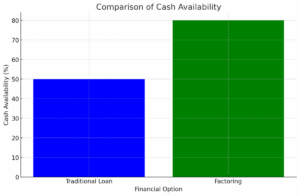Cash flow is usually the most significant issue for the smaller part of the middle-sized enterprises. The process of waiting for clients to pay their invoices for weeks or even months can put the development on hold and create unnecessary worry. This is the point at which factoring takes the stage. Factoring enables companies to turn unpaid invoices into on-the-spot working capital, thus allowing them to keep their function and follow the possibilities that arise without any interruption.
By just selling their invoices to a factoring company, companies acquire a trusty money source that serves both the need for cash flow and the planned expansion. Differing from the conventional loan, factoring is not adding new debts, but rather it is using the money owed to the company by customers to raise the cash flow. We will dive into what factoring is, the process of how it works, the upsides, the contrasts with other financing methods, and the tips for the selection of the right provider in this article.
Understanding Factoring and Its Importance
Factoring or invoice financing is a method whereby a company sells its accounts receivable to another company. The factoring company, which is the third party, essentially makes a large part of the invoice value available to the client upfront, while keeping the rest until the customer is paid.
Factoring is a life-saving option for businesses suffering from long payment cycles. By this method, the company can access the working capital without needing to borrow money, which is a good option for startups and SMEs in particular.
Key Benefits of Factoring:
- Simply changes invoices to the cash that you need to have right away.
- It enhances cash flow and thus, brings stabilization to the business.
- Offers funding that is quite expected for the business to grow and widen.
- Frees the company of the burden caused by the slow payments of customers.
Factoring is still the leading option as it changes receivables to resources, which are directly used for business continuity and further growth.
| Feature | Factoring | Traditional Loan |
| Debt Incurred | Not a source of debt | Raises debt |
| Approval Time | Short (if based on invoices) | Long(er) (requires credit checks) |
| Collateral Needed | Only accounts receivable | Assets or guarantees |
| Flexibility | Can increase or decrease with sales volume | Amount is fixed |
The Detailed Aspects of Factoring
Factoring is not something you can apply the same way to every problem. There are different versions that are customized secure finance for business needs and industries.
Recourse Factoring
According to this concept, the business is the one that covers a customer if he does not pay the invoice. In most cases, it comes with low fees.
Non-Recourse Factoring
In this case, the factoring company is the one that takes on the full risk of non-payment. Businesses, on the other hand, receive more protection despite the higher costs.
Invoice Discounting
It is almost the same as freight factoring except businesses keep their sales ledger and still get money against the unpaid invoices.
How Factoring Works Step by Step
- One or more companies sell their products or services to their customers and then issue them invoices.
- The companies decide to sell the invoices to a factoring company.
- The factoring company gives the business the money upfront (generally 70–90%).
- The customer pays the invoice directly to the factoring company.
- The business is given the rest of the money less the fees.
Factoring allows companies to continue their activities such as paying employees, buying materials, or seeking new contracts without having to wait for the money to arrive if they have been paid late.
Factoring vs Other Financing Methods
In comparison to overdrafts or loans, factoring has distinct benefits. The method of financing provides the user with the adaptability that expands with the turnover and does not result in the creation of a business with a long-term liability.
Case Study Example
A company in the manufacturing industry had £200,000 worth of invoices that it could not get paid for and needed money to make new orders. Factoring allowed them to get £160,000 in cash on hand which made it possible for them to purchase the raw materials necessary for production and complete it. When their customers payments arrived, the company received the remaining amount less the fees. This gave them the opportunity to grow their business without incurring additional debt.

The graph shows how factoring provides quicker and more consistent access to funds compared to loans.
Practical Tips for Selecting the Appropriate Factoring Service
Different factoring companies differ from one another. Business should take a close look at the services offered.
Aspects to Consider
- Experience in the Industry: Opt for providers that have knowledge of your area of business.
- How Fees Are Charged: Make sure that the pricing and advance rates are fully disclosed.
- Adjustability: Check for a solution that is compatible with the change of your sales volume.
- Convenience Services: A few companies may also be handling your collections, helping you to save administrative time.
Step-by-Step Guide to Getting Started
- Measure the cash that goes in and out of your business to figure out how much money you really need.
- Check different providers of the factoring service including their terms.
- Send your invoices to the company for them to review.
- Sign the contracts and get the money.
- Factoring is most efficient if you can combine it with solid money management and a trusted associate.
Conclusion
Factoring is not just a temporary solution; it is a smart business instrument that encourages verdant development. By making accounts receivable cash on hand, companies will be able to use the money to invest, pay their debts, and even alleviate the anxiety caused by waiting for their money to be credited to their account.
In case of Simply Factoring Brokers, your business is limited by the lack of cash, factoring might be the key to unlocking not only the stability but also the business’s increase. The next move should be to contact a reliable factoring agent to be aware of the potential of invoice financing to bring about a positive change in your business.


